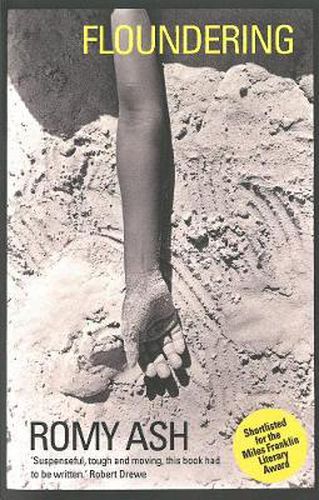Romy Ash talks to Tony Birch about Floundering
Debut novelist Romy Ash talks to Tony Birch about what it means to be a child both loved and abandoned, and the dark menace of Australia’s far-flung corners in her new book

Towards the conclusion of this remarkable debut novel by Romy Ash, Nev, a crusty and dangerously flawed loner, holding court with himself in a caravan at the edge of nowhere, gives advice to our young narrator, Tom, and his older streetwise brother, Jordy. ‘You’re chasing a mirage,’ he tells them, as the three drifters try hauling a submerged length of rope from the sea (which is anchored to an island).
The mirage they seek is not a catch they hope may be on the other end of the line, but the boy’s wayward mother, Loretta, who, despite the love she has for them has placed them in emotional and physical danger through her erratic behaviour. As she drags her sons across a thirst-quenching landscape we are drawn into a journey from which there seems to be no escape.
Romy Ash has been writing short stories for some years now, and won several major literary prizes. Those of us who know and admire her work have been eagerly awaiting the publication of Floundering. The novel was shortlisted for the 2011 Australian/Vogel Literary Award and was snapped up by the astute Melbourne publishing house Text, a champion of quality Australian writing. With recent debates surrounding the status of Australian literature in mind, readers of Floundering will discover a book steeped in both ‘local’ themes and universal notions of what it means and feels like to be a child seemingly loved and simultaneously rejected by a parent.
The boy at the centre of the novel, Tom, is a wonderfully composed character, who projects both tenderness and strength in equal measure. His older brother, Jordy, who is more distanced from the reader, and certainly from his mother, has learned through experience what it is he needs to do in order to survive. The authenticity of the novel is dependent on the pitch-perfect voice of Tom, which is delivered with understated emotion.
I found Tom’s mixture of naivety and resignation to be utterly convincing. When I spoke with Romy Ash about the development and writing of Floundering she told me that while she did not have an individual ‘real life model’ in mind for Tom, she in some ways had several.
‘A young boy’s voice is definitely one I am familiar with,’ she told me. ‘As a child I spent a great deal of time with boys, most of my friends were boys and I guess I was a tomboy. Writing from a young boy’s perspective didn’t seem so far from writing my own.’
If we take the age-old advice ‘write what you know’ with any seriousness, Ash knows Tom and Jordy intimately. And we come to know them too. We worry about them, we take each perilous step with them along a bumpy road, and in the final scene of the novel, delivered with such poignancy and maturity by the author, we are numbed by our love for them.
While it would appear natural to care for Tom and Jordy – after all, we want to protect them from danger – the central adult characters in Floundering, Loretta and Nev, are less likeable in the first instance. Both are complex, if dysfunctional, characters.
Loretta has clearly been absent from the lives of her sons when, out of the blue, she collects them on the street at the beginning of the novel, removing them from the care and stability offered by their grandmother. In the hands of a lesser writer we could easily dismiss Loretta as a ‘no-hoper’, and have little or no sympathy for her. In Loretta, Ash feels that she created a character who is ‘the driving force within the book’, a mother who ‘loves her boys fiercely and I guess that’s part of the problem’. The problem being, of course, that as Loretta does love her sons, perhaps a little too much, she at times does not know what is best for them and is oblivious to the danger they face.
An equally complex character is Nev. He lives in a rundown caravan at the end of a road that we can imagine as the furthest place in the vast Australian landscape that a person escaping society, and himself, could journey to. He is the consummate outsider, who drinks alone, fishes alone, and most likely talks to no one. The only hint of his past is offered in the faces of children, tattooed on his arms; children he no longer has any knowledge of or contact with. Whether he was abandoned, or abandoned his own life, we know that Nev is marooned from society, with no desire to be rescued.
When Nev first meets the boys he yells at them to ‘get out of here’ and shows no indication of warming to them. Ash comments that Nev ‘really wants to live life as the best version of himself’. Unfortunately, the only way he can achieve this is to ‘shut himself off, living in an incredibly remote area for his own good’. In attempting to frighten the boys away, Nev is also trying to corral himself. He carries a secret, one that is revealed without drama, but with tragic understanding.
Occasionally I am privileged to read a novel where the insight gained into the lives and psychological dynamic between characters reveals not only the emotional depth of the book, but my own potential for understanding. In her portrayal of Nev, Romy Ash has reached into my consciousness and invited me to challenge my own thinking and views on an issue of great sensibility. In doing so, she has helped me to shift my thinking.
There is another character central to the success of Floundering – the imagined landscape composed by Ash. It is at once familiar – the beach, the freedom of a barefoot summer, the intoxicating scent of salted hot chips drenched in vinegar – and the menace of unexplored darkness and the mystery and shadows it contains. The novel contains disturbing Wake in Fright moments, without ever being derivative of that novel, or subsequent film.
Ash wants readers to experience the ‘oppressive heat and environment’ of an Australia beyond the big cities and eastern seaboard. Her rendering of the ‘unrelenting heat’ and remote, almost hidden campsites and hiding places was, again, gathered through experience. She ‘travelled extensively around Australia and there are these little camps in the far-flung corners. I wanted there to be a tension between the tourists, who holiday there and those who have chosen to live out their lives in these remote places.’
Floundering is a novel raising difficult issues. How can we best care for children in our society? And who is best placed to make such decisions? During a year that celebrates the life of one of the great writers in English, Charles Dickens, contemporary authors continue to address issues similar to those he was concerned with in mid-Victorian Britain; inequality, the marginalised and the vulnerable, particularly children. If Dickens were writing in the early twenty-first century I believe he would write a book dealing with the themes of this one. This does not indicate that Romy Ash’s writing is in any way dated. Far from it. The story she tells is at the cutting edge of contemporary social issues. Floundering is a novel to both enjoy and feel generously challenged by.
Tony Birch’s latest novel is
Floundering
A book by Booki.sh



